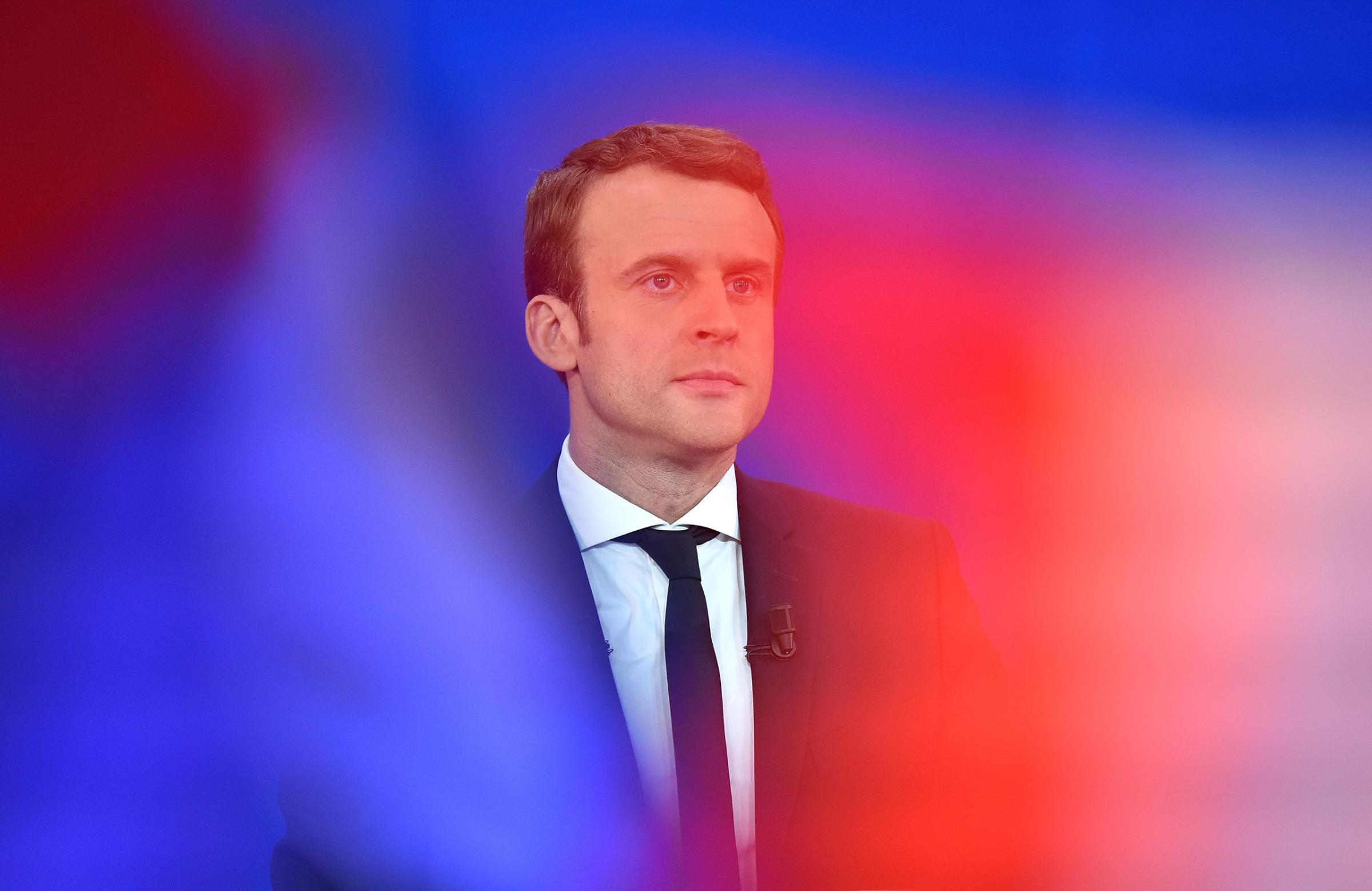No matter whether centrist economist Emmanuel Macron or far-right National Front leader Marine Le Pen wins France’s presidency in two weeks’ time, Sunday’s first-round election made history in France — ripping up the political system that has governed for generations over the world’s sixth biggest economy and a powerhouse of the European Union.
Both the ruling Socialists and the conservative Republicans suffered crushing defeats, as millions of French voters expressed years of exasperation, fear and disillusion by voting for insurgent or extremist candidates. The runoff round between Macron and Le Pen — Sunday’s two top vote getters — is on May 7.
As the polls closed at 8 p.m., the results appeared to be a collective cri de coeur against the establishment. “This is huge,” says Pierre Haski, political columnist for the news magazine L’Obs, speaking to TIME after the vote. “The two parties that have dominated the political landscape for three or four decades have collapsed.”
The next President of France now seems highly likely to be Macron, who captured the most votes among 11 candidates on Sunday. That itself is a stunning new reality. Macron, just 39, would be France’s youngest-ever president by far if he is inaugurated in the ornate Élysée Palace on May 15.
What is more, he has never held elective office and has no traditional political party to call his own; he quit President François Hollande’s government as Economy Minister last September to create his own political movement, called En Marche! (On the Go!), and drafted thousands of young French to knock on doors across the country, polling 100,000 people about how they wanted their country to change.
It was a gamble that seems to have paid off — and now, it could catapult this newcomer into power. It is hard to overstate the extraordinary and surprising nature of that accomplishment.

“In one year we have changed the face of French politics,” Macron told his ecstatic supporters at his victory party in Paris late Sunday night, saying that his win brought “new hope for our country, and for Europe.” Amid the crowd of giddy supporters were many young French voting for the first time, who said in interviews they had been drawn to a candidate that appeared young and modern — a striking change from the fairly small group of grandees who have run the country for many years.
The preliminary results Sunday night put Macron at 23.9%, Le Pen at 21.7% and the Republicans’ candidate François Fillon around 19%. The Socialist candidate Benoît Hamon polled a disastrous 6% — a potential death knell for the party that has ruled France for five years. Fillon and Hamon, in somber concession speeches, admitted they were facing an entirely new political situation as outsiders. Both called on supporters to back Macron in the second round vote on May 7.
Standing in a hall in southern Paris, hundreds of Macron’s young campaign volunteers broke into wild applause and cheers of “Macron Président!” as Fillon, projected on a large-screen monitor on stage, said, “I will be voting for Emmanuel Macron.”
Indeed, Macron’s lead over Le Pen on Sunday could potentially increase once all the votes are counted. That is because the early estimates do not include big cities like Paris, which are bastions of support for the former Rothschild investment banker, who is intent on modernizing the country and unraveling generations of state-heavy intervention.
When TIME profiled Macron last July, while he was still serving in Hollande’s Cabinet, he said he believed the current system was “sclerotic” and could not survive. “I am a newcomer,” he told us then. “I want to remain a newcomer. It is in my DNA.”
Read more: Emmanuel Macron Has Big Plans for France. Is It Ready for Them?
Now, however, he will need to become the ultimate insider: Piecing together a coalition to smash Le Pen’s National Front in the runoff round, and then to force through an agenda that could well spark violent protests. That includes loosening the way companies hire and fire employees, cutting back on steep wealth taxes for the richest French and luring hundreds of thousands of French expats back home; those include countless high-skilled professionals in Silicon Valley and London’s financial hub, who left France in recent years, frustrated by the lack of growth.
Macron’s ability to push through his programs will depend heavily on the parliamentary elections in June. His political movement, which currently has no representation, has scrambled in recent weeks to find candidates for the June vote. “En Marche! has received 15,000 people who want to be deputies,” Macron campaign spokeswoman Laurence Haim told TIME earlier this week. “We have commissions that are looking at each candidate, and we want parity and diversity, to completely transform the face of political life in France.”
That is just one challenge, however: Le Pen.
The 48-year-old won the biggest-ever support for the National Front in Sunday’s election. She has spent six years remaking the party from her father’s far more rabidly racist and anti-Semitic movement into an electable force. In some ways, she succeeded in that on Sunday.

Tapping into deep unease over the migrant crisis and the terrorist threat, Le Pen stormed through the country arguing that France needed to close its borders and virtually halt all immigration, promising to hold a referendum to pull France out of the E.U. and drop the use of the Euro. Speaking to her supporters on Sunday night after the vote, Le Pen vowed she would take her support all the way to the Élysée.”Globalization puts our country in danger,” she thundered, to a packed hall in the northern France town of Hénin-Beaumont.
That message clearly hit home with millions of voters on Sunday. When TIME traveled the hard-hit Rust Belt of Northern France in February, many Le Pen supporters said they believed global free trade, which Macron supports, had failed French workers. “We don’t think that finding workers that are cheaper and cheaper, with worse working conditions, is a good thing for the people of the world,” National Front activist Éric Richermoz, 24, told TIME then. “The National Front is the only party that gives people hope in these elections,” he said in the northern town of Amiens.
Now, Macron will need to reckon with that fury—even if he succeeds in winning the presidency. And there is fury too on the other side of the political spectrum: 19.2% voted for the far-left politician Jean-Luc Mélenchon, who fought to nationalize major industries and to reconsider France’s E.U. membership.
“He has to take into account the anger of people who voted for Le Pen and Mélenchon,” Haski says. In addition, he says, Le Pen has attempted to cast herself as France’s Trump — the candidate of change — vs. a Hillary Clinton–type opponent — the embodiment of an old establishment. She has said frequently, including to TIME in recent months, that she regarded Trump’s victory as a sign that she too could prevail against all odds.
“She portrays this election as a replay of the U.S. election, Trump vs. Clinton,” Haski says. “That is a trap that Macron does not want to fall into.”
More Must-Reads from TIME
- Why Trump’s Message Worked on Latino Men
- What Trump’s Win Could Mean for Housing
- The 100 Must-Read Books of 2024
- Sleep Doctors Share the 1 Tip That’s Changed Their Lives
- Column: Let’s Bring Back Romance
- What It’s Like to Have Long COVID As a Kid
- FX’s Say Nothing Is the Must-Watch Political Thriller of 2024
- Merle Bombardieri Is Helping People Make the Baby Decision
Contact us at letters@time.com